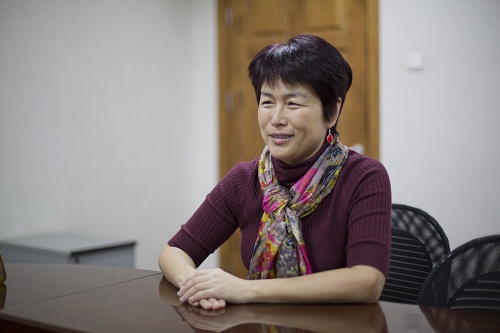Cultural Ambassador: Professor Hu Xiaojiang on Building Bridges Between China and the World

This post is sponsored by the Beijing Normal University School of Social Development and Public Policy, an international program comprised of students and faculty from around the world. Visit www.ssdpp.net.cn/en to find out more.
Professor Hu Xiaojiang exemplifies the internationalism of Beijing Normal University’s School of Social Development and Public Policy. “All of us [who study abroad] are cultural ambassadors,” says the 45-year-old professor who is originally from Beijing. “So I think making that connection [between] two countries very different [from each other], is very important.” Professor Hu can speak from experience, she received her PhD in sociology from Harvard University in 2004 and subsequently came back to China to teach courses on Migration and Social Transition as well as Research Methodology at BNU. Professor Hu spoke with the Beijinger to talk about how internationalism is one of the key strengths of the BNU program.
How do you see the role of the program at BNU?
China wants to open to the world and Beijing wants to be a world city, China and Beijing need to learn how to accommodate people from all over the world, [people with] different cultures, different religions; China is in this process, Beijing is in this process and we are doing our part at the school.
How has that process been going? Any recommendations?
I think the bar was set low at the beginning, because China had a feeling that it is a very homogeneous country and all foreigners were just temporary guests. I think it is changing, but it will take a while. The laws and policies for foreigners should be more [accommodating]. 
How do you find the interaction between the students?
I think having students from all over the world is very good, both for our school and for the university. I think just the mere fact that you can walk around the campus and see people from all over the world is a great thing. We have always tried to mix [the Chinese and foreign students, but] so far the mix is mostly on the social part. [The] intellectual action is still pretty primitive, because of the language issue. You can’t really discuss a deep academic issue without the language background.
How do you find academic research materials in English and Chinese, is there a divide between the two worlds?
I think they talk to each other. Sometimes we have very good source material, but it’s in Chinese and [professors in a class]might not use it. In my field [of immigration] there is a lot of research in English. We also have [had] situations where a Master’s student will choose a topic and say there’s not much literature on that topic, but in fact, there is a lot of information in Chinese.
Are the students able to put the knowledge they are learning in class into practice?
We do have an internship program. It’s hard to do an internship in the Chinese government, but there are more opportunities in the NGO space.

How's the NGO space in China now?
It’s growing pretty fast. I think the government is making changes. [Recently, they have made a] policy of purchasing services from NGOs and have made that part of official policy. There are pilot projects all over the place and the idea is taking mainstream. So in a lot of public places the government is [implementing] it.
What do you think are the advantages of studying here in this program?
I think apart from the school, China is attractive. We are also different from other Chinese programs. Other programs focus more on Chinese culture or language, calligraphy, that kind of thing. We [study] social sciences, policies that kind of thing. For those students that studied social development and policy [previously], there are a lot of opportunities for them to get involved in NGOs [in China for example].
Do you think that these students will be able to make a contribution to China or their home countries in the future? What do you think those contributions might be?
Yes. I think [making a] contribution to China and to their home country is [the same] thing. All of us are cultural ambassadors. So I think making that connection [between] two countries very far away [from each other], very different [from each other], is very important, having that understanding is very important. And of course that will lead to business opportunities, collaboration and many other things, but this exchange by itself is important.
What do you think is the most important thing that students will take away from the program?
We tell the students that they should make friends because students are from all over the world and they can make good friends,[those contacts are] very important for their future and [enables them to] have connections all over the world.
Also, we want to teach them that social issues and social development are complex issues, that there is a science behind it, [and] it’s better to have deeper understanding about what something means then to just have passion about something. [Sometimes, just having] passion, but not a good understanding of reality, can cause a lot of harm.
Photos courtesy of Beijing Normal University

